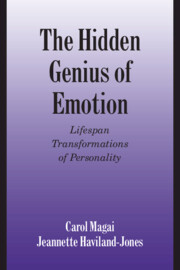Book contents
- Frontmatter
- Contents
- Preface
- Part I Introduction
- Part II Emotion as the Integrative Link in Social and Personality Development
- 3 Lives Attracted to Shame and Longing
- 4 Lives Repelled by Fear and Distress
- 5 Lives Repelled and Attracted by Contempt and Shame
- Part III Emotion as the Link in Intellectual Work
- Part IV Emotion as the Link in Therapeutic Behavior
- Part V Presenting a New View
- Appendix
- References
- Subject Index
- Author Index
- Cambridge Cultural Social Studies
4 - Lives Repelled by Fear and Distress
Published online by Cambridge University Press: 25 June 2009
- Frontmatter
- Contents
- Preface
- Part I Introduction
- Part II Emotion as the Integrative Link in Social and Personality Development
- 3 Lives Attracted to Shame and Longing
- 4 Lives Repelled by Fear and Distress
- 5 Lives Repelled and Attracted by Contempt and Shame
- Part III Emotion as the Link in Intellectual Work
- Part IV Emotion as the Link in Therapeutic Behavior
- Part V Presenting a New View
- Appendix
- References
- Subject Index
- Author Index
- Cambridge Cultural Social Studies
Summary
Albert Ellis, unlike the other two men who are the focus of this volume, is still alive today. At the age of eighty-nine, he is a seasoned therapist who remains professionally active. During the 1960s, he was most well known as a sex educator who promulgated progressive views. Later on, he became renowned as the developer of Rational Emotive Therapy (RET), which can be considered the forerunner of cognitive-behavior therapy.
Ellis's influence in the field of clinical and counseling psychology has grown considerably over the years. Although many psychologists regard him as eccentric and at odds with more traditional clinical practice, the notoriety of his public persona does not seem to have tarnished the evaluation of his historical contribution. In 1982, no fewer than three journal articles accorded him special acknowledgment. The American Psychologist ranked him as the second most influential psychotherapist in the world at that time. The Journal of Counseling Psychology determined that he was the most frequently cited author in professional journals since 1957. The Journal of Marital and Family Therapy cited him as the fourth most influential theorist. Consistent with these important signals of recognition, in 1986 he received APA's Award for Distinguished Professional Contribution.
In his work at the Rational Emotive Institute, Ellis remains an extraordinarily active psychologist. A 1988 biography of him described a seventy-five-year-old Ellis putting in an eighty-five- to ninety-hour work week, daily from 9 a.m. to 11:00 p.m. Over his lifetime, he published dozens of books and hundreds of articles.
- Type
- Chapter
- Information
- The Hidden Genius of EmotionLifespan Transformations of Personality, pp. 103 - 145Publisher: Cambridge University PressPrint publication year: 2002



